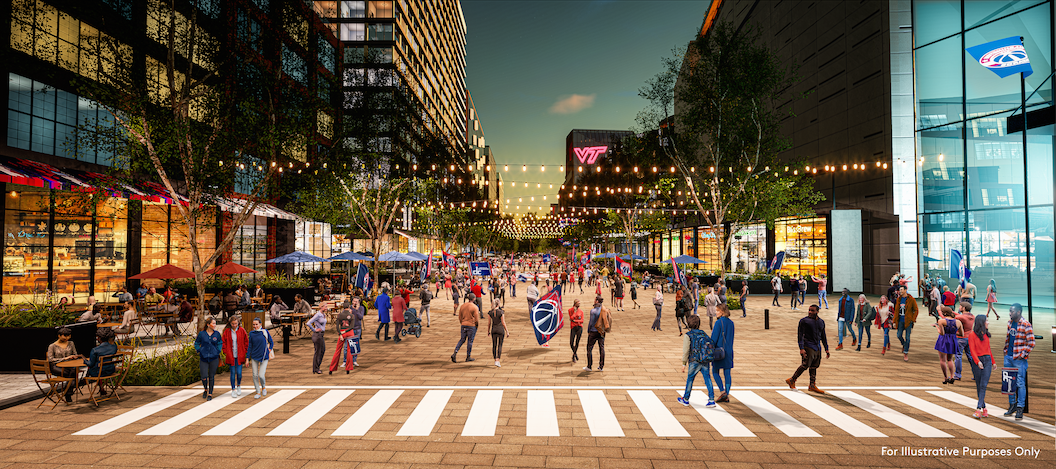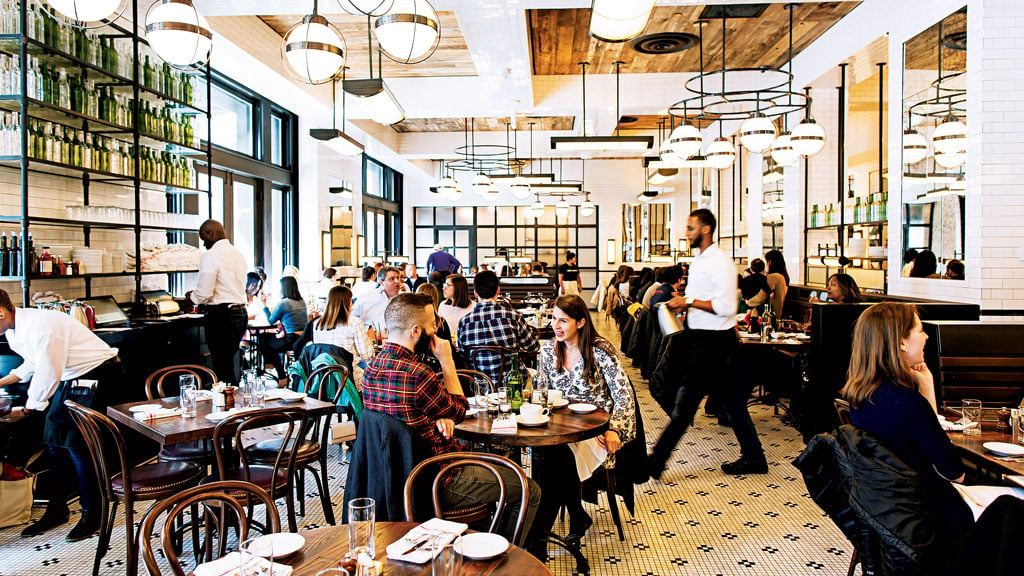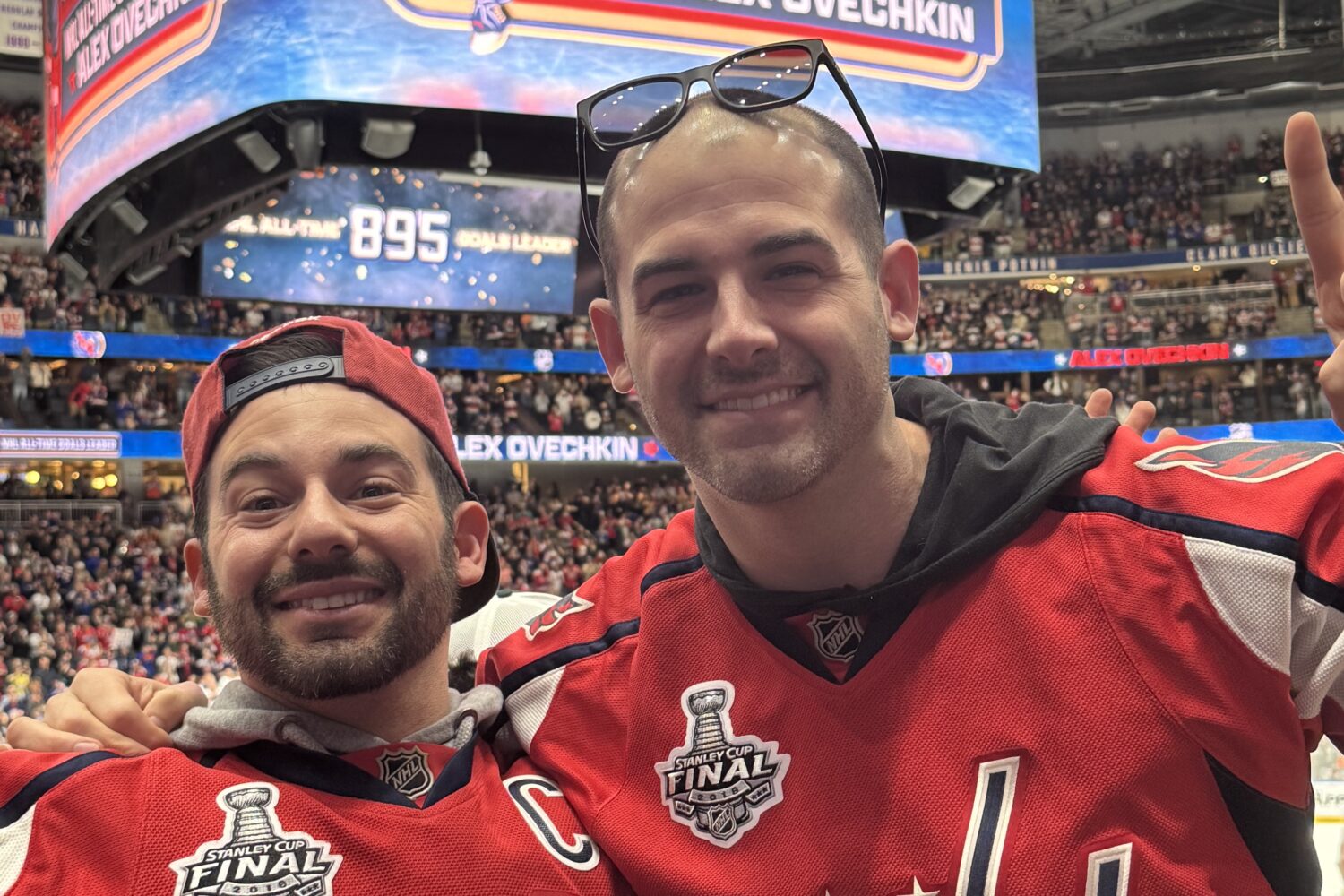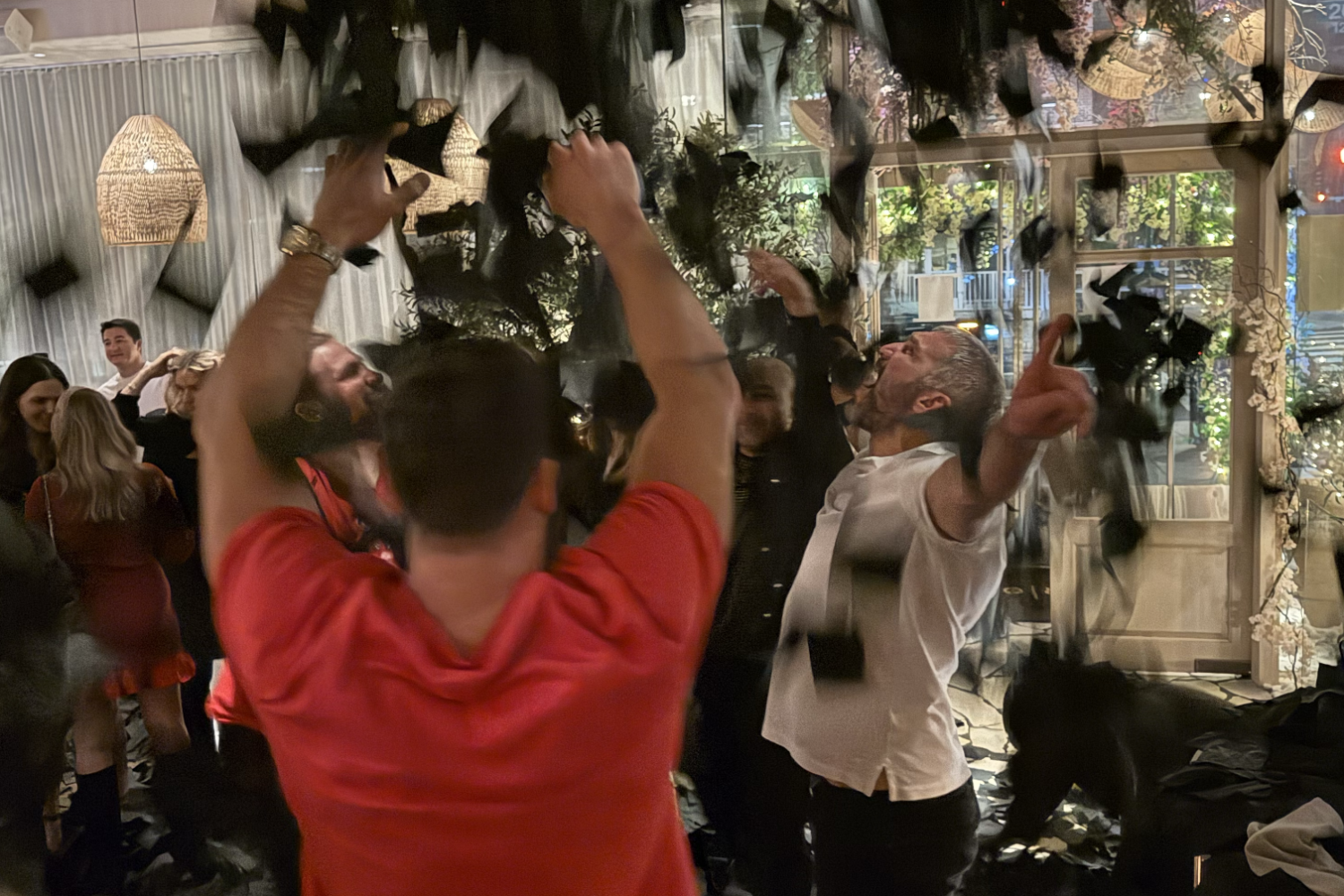It’s official: The Washington Capitals and Wizards are planning to leave Washington for Northern Virginia. Team owner Ted Leonsis and Virginia Governor Glenn Youngkin appeared together Wednesday in Alexandria to announce a $2 billion development project in Potomac Yard that would include a new arena and practices facilities for both professional sports teams, as well as other goodies for Leonsis’s Monumental Sports & Entertainment company.
The move, which Monumental plans to make in 2028, would be a significant change for downtown DC. The Caps and Wizards have called Capital One Arena home since its 1997 opening, and the building’s presence—along with its National Basketball Association and National Hockey League anchor tenants—has been widely credited with helping kickstart the redevelopment and revitalization of the area. Losing both teams could further impair a downtown economy already struggling to recover from the pandemic.
The Potomac Yard project announcement comes on the heels of an 11th-hour effort by DC city officials to keep the Caps and Wizards, with Mayor Muriel Bowser and Council Chair Phil Mendelson announcing legislation late Tuesday night that would give Monumental $500 million in public money to renovate Capital One Arena and extend its lease there until 2052.
If that last-ditch effort fails, DC will be without both teams for the first time since 1997. How did we get here? What, exactly, is happening? Where are things going? Glad you asked!
So what’s the plan for Potomac Yard, exactly?
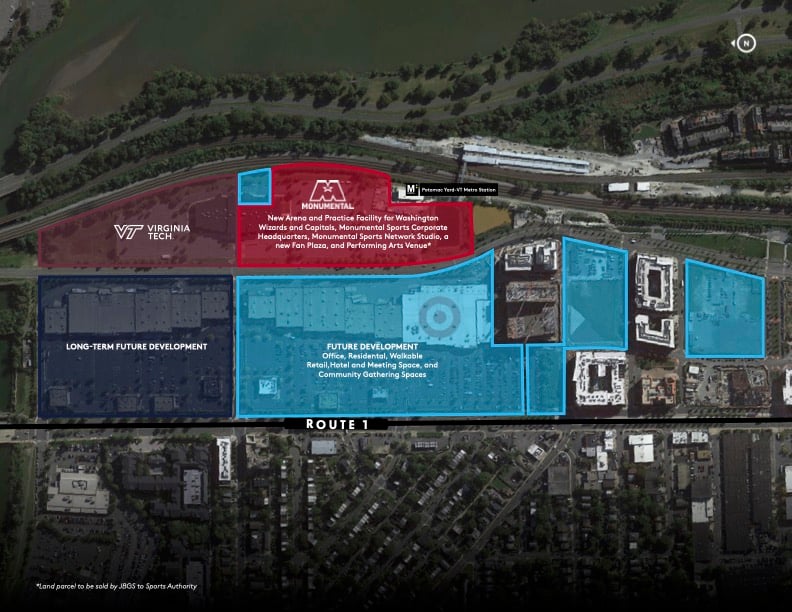
It’s pretty, pretty, pretty big. In addition to a new, 20,000-seat sports arena, the non-finalized plan reportedly includes new practice facilities for the Caps and Wizards, new offices and network studios for Monumental, a Monumental e-sports facility, a performing arts venue, new parking and road infrastructure, a “fan plaza”—read: empty space, for standing—and office, residential, retail, and hotel buildings.
The Monumental part of the development would also sit just south of a Virginia Tech innovation campus already under construction, and northeast of the Potomac Yard Metro Station that opened in May.
Who’s picking up the $2 billion tab?
Taxpayers, mostly. While funding details have yet to be fully hammered out, the Washington Business Journal reports that the general shape looks like this:
- $1.4 billion in bonds issued by a new Virginia Sports and Entertainment Authority
- $459 million from Monumental
- $106 million from the city of Alexandria
Is this a done deal?
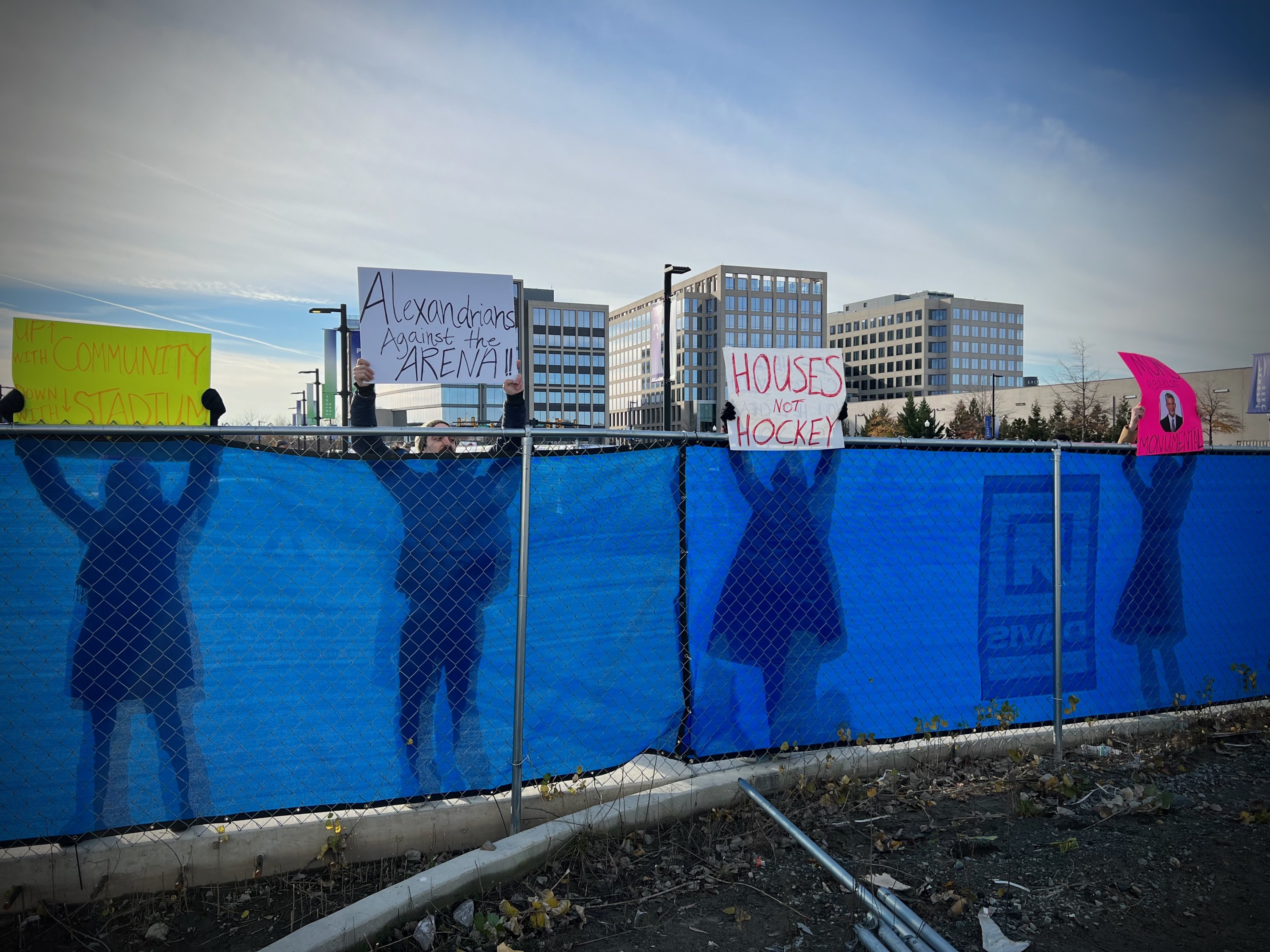
Not entirely. While groundbreaking is planned for 2025 with an opening date of 2028, the plan and its attendant price tag still need to be finalized. More importantly, they also need approval from both Alexandria city government and Virginia’s state legislature.
Of course, it’s very likely that Youngkin and Leonsis would have put on a highly public dog-and-pony show—featuring US Senator and tuna melt aficionado Mark Warner, no less!—without already having the necessary votes in their pockets. However, the politics of public financing for sports can be tricky and volatile, because said public generally hates giving free money to billionaires. Moreover, a Democratic-controlled Virginia legislature may not want to hand Youngkin, a Republican governor and potential presidential candidate, anything resembling a high-profile political victory.
Oh, and the enduring power of NIMBY-ism should not be underestimated.
So DC still has a chance to keep both teams?
It’s not quite over—but the city is a long, long, long way from being back. Basically, Virginia needs to step on multiple rakes.
How did this happen?
According to the Washington Post, Leonsis has been unhappy with his $36 million-ish annual mortgage on Capital One Arena, which in 2016 he called the “worst building deal in professional sports.” The billionaire Monumental owner also has been asking DC for $600 million to renovate Capital One, money city leaders have not been in a rush to provide despite reported ongoing talks.
Talks between Monumental, Virginia officials, and Bethesda developer JBG Smith—which controls most of Potomac Yard and the larger National Landing area—reportedly began this spring. The Post reports that Youngkin already has pitched several state lawmakers on the project as well, and that he specifically began talking to Democrats after Republicans lost control of the Virginia House in November.
It seems like Bowser and other city leaders took their eyes off the ball—or puck, if you prefer—on this.
Sure does!
So are they to blame?
Somewhat, but not fully. Could city officials have moved much faster to shovel cash at Leonsis, and also offered the full $600 million he wanted? Yes. Could they have done more—as some poster on DC Reddit is undoubtedly arguing, loudly, right now—to make the area around Capital One feel more safe and less crime-y? Also yes.
That said, this news is less about what DC couldn’t, wouldn’t, or didn’t do than what Virginia appears poised to give: way, way more money to Monumental, as well as an opportunity to boost the value of its portfolio sports teams and other businesses as major components of a entertainment and real estate hub that—for now, at least—is all growth and upside. (See also what the NBA’s Mavericks are attempting to do in Dallas).
What does this mean for downtown DC?
Nothing good, probably. Capital One Arena reportedly hosts 220 events a year that drive between 2 and 2.5 million people to downtown; the surrounding neighborhood has experienced almost $9.2 billion in redevelopment since 1997; Monumental claims the building has generated $800 million in city tax revenue over the same period.
Losing all or much of that kind of activity to Potomac Yards—not just Caps and Wizards games, but also potentially concerts and other events—likely will be both a symbolic and economic blow to an area that has been hurt by pandemic and post-pandemic shifts in office work, with falling commercial real estate values, restaurant and retail closures, and increased safety and crime concerns.
Monumental will continue to own Capital One Arena, and Leonsis said Wednesday that the area can continue to host women’s sports. The company also said in a press release that losing its NBA and NHL teams will allow the arena to accommodate “more family shows” and “annual bookings and mini-residencies that require long-term planning.”
What the future looks like—and how bad it could get—remains to be seen. Yesim Sayin, executive director of the DC Policy Center, which studies DC’s finances and economy, gave a grim assessment to Washington Business Journal. “This is something we would not be able to undo for a very long time,” she said. “If the teams moved out, we are probably looking at a 30- or 40-year recovery.”
Coming soon to downtown Washington DC pic.twitter.com/9C99TmWMZd
— Derrick Holt (@TheDerrickHolt) December 12, 2023
What happens to the Wizards practice facility and Mystics/Go-Go arena that the city opened all the way back in … 2018?
You mean the one the city spent, like, $50 million-plus on? Good question! Here’s another one: can you really call a team the “Go-Go” if it’s playing in NoVa?
Will Virginia taxpayers get their money’s worth?
Almost certainly not. During Wednesday’s event, Youngkin and others involved in the project claimed that the deal would create roughly 30,000 jobs and result in an economic impact of $12 billion over the coming decades. No one showed their work, however, and almost certainty with good reason: more than 130 studies by independent economists have shown that the economic impact of sports stadiums is wildly and consistently overrated, with public subsidies for their construction mostly failing to create jobs, spur local development, or pay for themselves via increased tax revenues. As University of Chicago economist Allen Sanderson once quipped, “if you want to inject money into the local economy, it would be better to drop it from a helicopter than invest it in a new ballpark.”
What does this mean for the Commanders?
Today is a tremendous day for relatively new Commanders owner Josh Harris, who is actively seeking a juicy new stadium subsidy package from Virginia, Maryland, and DC lawmakers and just learned that the latter group is: a) extremely open to negotiating with economic hostage-takers; b) likely embarrassed about losing the Wizards and Capitals and probably very motivated to find a new sports beau to lavish with attention and gifts.
Is Ted Leonsis living long enough to see himself become the villain?
Long seen as the DC area’s Good Guy Sports Owner—granted, when your main competition is Dan Snyder, the bar is pretty low!—Leonsis will now be remembered, at least in part, as someone who bailed on the city during an already tough time. (During Wednesday’s event, Leonsis also engaged in what can only be described as cheerful civic gaslighting, painting DC and NoVa as basically the same place while noting, “it’s no secret that this great airport here was considered Washington National, and yet it’s in Virginia.” Come on, man!)
Still, calling this a Leonsis heel turn would be a mistake. And terribly naive. His decision to take the money and run to, uh, Natty L doesn’t mean he’s changed for the worse. It means he’s the same guy he has always been—a sports team owner. In 2016, Leonsis told the Post that his goal for the Capitals and Wizards was to “stay where we are or stay within the city,” while also saying that “I don’t know what’s going to happen five, six, seven years from now . . . I will be a free agent. I mean, that hasn’t been lost on me.”
So it goes. Sure, sports teams can feel like public goods, and the teams themselves constantly market their product as such. But don’t be fooled. The Caps and Wizards and Mystics and all the rest exist for exactly one reason: to make a buck. If they had a greater purpose, if they truly belonged to their communities, they wouldn’t make privatizing profits while socializing costs the core of their business model—and the NFL wouldn’t have actual rules prohibiting public team ownership.
What does this mean for the Wizards’ annual “city edition” jerseys?
Unless irony is on the menu, you probably won’t see a repeat of this year’s unis, inspired by DC’s boundary stones.
Once they move in a few years, will we ever see the Capitals or Wizards play in DC again?
The Potomac Yard plan reportedly includes a 35-year lease for Monumental. At some point well before that—I’d guess 15 to 20 years, tops—whoever owns the teams at that time (Ted Leonsis, his heirs, Qatar’s Sovereign Wealth Fund, a billionaire TBD) will almost certainly come to Virginia lawmakers and complain that a once-state-of-the-art arena is now hopelessly obsolete, and that only $1.5 trillion in taxpayer money can make things right. Meanwhile, that same owner will also be sliding into the DMs of DC and Maryland lawmakers, and any other city with land, money, and a desire to feel major league. So sure, the Caps and Wizards could return. Someday. Time is a flat circle.

